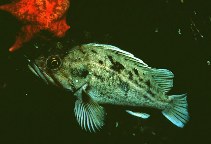| Family: |
Sebastidae (Rockfishes, rockcods and thornyheads), subfamily: Sebastinae |
| Max. size: |
56 cm TL (male/unsexed); max. reported age: 34 years |
| Environment: |
demersal; marine; depth range 0 - 128 m |
| Distribution: |
Eastern Pacific: Prince William Sound, Alaska to central Baja California, Mexico. |
| Diagnosis: |
Dorsal spines (total): 13-13; Dorsal soft rays (total): 12-15; Anal spines: 3-3; Anal soft rays: 5-8; Vertebrae: 26-27. Head spines strong - nasal, preocular, postocular, tympanic, coronal (may be absent), parietal, and nuchal (may be absent) spines present, supraoculars absent (Ref. 27437). Interorbital space flat to barely convex; symphyseal knob weak or absent (Ref. 27437). Caudal fin rounded (Ref. 6885). Light brown, mottled with one or two shades of darker brown, vague dark bars dorsally, dark brown blotch on upper part of gill cover; fins and underside of throat and lower jaw pinkish (Ref. 27437). Branchiostegal rays: 7 (Ref. 36715). |
| Biology: |
A sedentary rockfish found in shallow water and bays (Ref. 2850), among sheltering weed-covered rocks or around pilings (Ref. 27436). Viviparous, with planktonic larvae and pelagic juveniles (Ref. 36715). Fin spines are sharp and mildly venomous and can cause annoying wounds (Ref. 27436). Small live specimens make excellent bait for large lingcod (Ref. 27436). Flesh is firm and tasty, but rarely found in markets (Ref. 26346). |
| IUCN Red List Status: |
Not Evaluated (N.E.) Ref. (130435)
|
| Threat to humans: |
venomous |
Source and more info: www.fishbase.org. For personal, classroom, and other internal use only. Not for publication.

